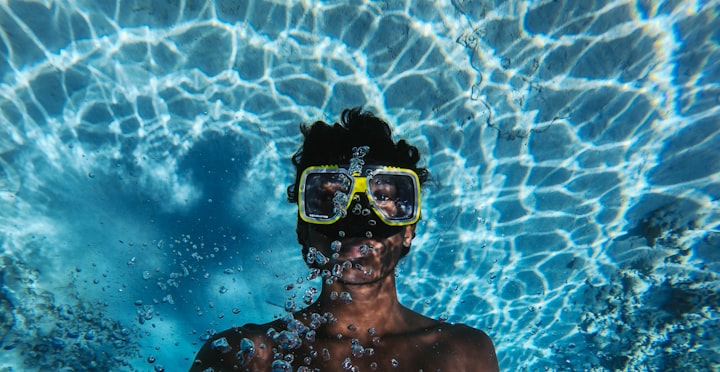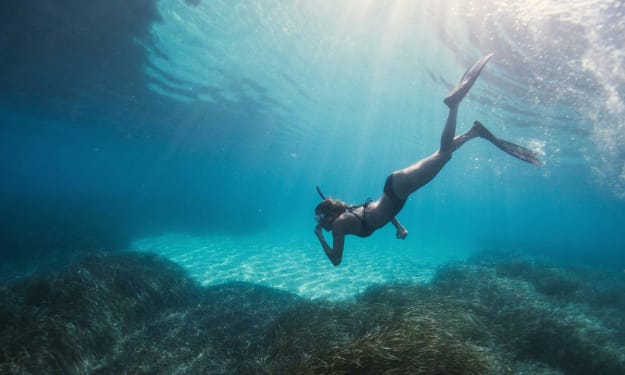Annette Learns to Freedive
3 Tips on Breathing for Beginner Freedivers

Getting Acquainted
About a week ago, we grabbed some snorkeling gear and raced to Playa Negra to catch some of the last afternoon light.
I had never been snorkeling before and didn’t have much in the way of expectations other than maybe a smidge of nerves because I am not as comfortable in the ocean as I am in the mountains.
The sun was getting pretty low when we got to the trail leading to the beach but we made it in time to get a good 30 minutes of snorkeling in.
“Walk backwards,” Jim instructed as I giggled, lifting one silly fin-covered foot then the other.
— “Does it ruin the fins if I walk forward?”
“No, you just might fall on your face.”
— “Oh.”
At first, it feels a bit cognitively dissonant to sink one’s face into water and expect to breathe, but you get the hang of it pretty quickly and wow, what a whole new world that opened up to me!
I have never seen this world before, and it lay just beneath the waves, at my feet. I puttered about underwater, getting used to the fins, taking shaky videos with my GoPro, and learning to hold my breath for shots of the ocean floor.
What a world.

Practically Pro
The next day, we went back. This time, we passed a small group of people at the beach.
An old beach bum smoking a cigarette with a devil-may-care attitude nodded his acknowledgement. To his left, a Caribbean beauty past her prime sat coolly, giving just the tiniest smile, her bright purple lips contrasting with her dark skin. And to her left, a squishy lady rolled over, responding to Jim’s greeting.
“Good idea bringing your fins,” she said, remarking on our cargo.
This time, I was no longer a fresh newbie and felt supremely cool putting on my gear as if I was somebody who actually knows what they’re doing.
I dropped in; into the water, into a quiet peace, into a world within a world.
There is nothing quite like it that I’ve ever experienced and when I hold my breath and dive down to the ocean floor, the silence becomes stunning.
There is this eerie moment when I start to ascend where it is as if time has stopped and the silence seems to drop another octave lower. In that moment, I am still.

Technicalities
The very first day, I started off at a high of 00:15 seconds breath hold but by the second day it had increased to 00:30 seconds, which has consistently been my max since then. I’m currently learning how to deepen and lengthen these holds.
This guide from Deeper Blue has some great tips on breathing that I will take on our next snorkeling adventure, like:
- How to breathe in preparation for a dive, otherwise known as “breathe up”. It’s important to do because it lowers the heart rate and “prepares the body to stay relaxed” during the dive which is key to breath-holds (Hoesterey). Interestingly, due to something called the mammalian dive reflex, immersing your face in water “automatically decreases heart rate by about 15–25%” (Hoesterey). Check out this post for clear and easy directions on how to breathe up before a dive.
- How to take the last breaths right before diving. It’s all about diaphragmatic breathing. And another key component is to expel as much air as possible on the last exhalation so that you can fill your lungs to max+ capacity on the inhale before you dive. Start the inhale with your belly, expanding to full capacity, then fill the chest, and then fill even up to your collarbones and throat (Farrell).
- How to breathe right after diving. This process is called “recovery breathing” and is basically just taking short quick breaths in and out until you’ve recovered. It is important to do as a practice against hyperventilation, which is “over-breathing”, and can cause serious symptom like blackouts and other health risks (Farrell). The article recommends doing it after every dive, even short ones, to reinforce the method as an automatic habit.

References
- Farrell, Emma. “Breathing For Freediving.” Deeper Blue, 10 May 2016, https://www.deeperblue.com/breathing-for-freediving/.
- Hoesterey, Morgan. “This Freediving Exercise Called ‘Breathe-Up’ Will Benefit Your Everyday Life.” The Inertia, 28 Aug. 2017, https://www.theinertia.com/health/this-freediving-exercise-called-breathe-up-will-benefit-your-everyday-life/.
Originally published at https://www.tantrabanter.com on September 17, 2020.
About the Creator
Annette Kim
Forget rules | Live true






Comments
There are no comments for this story
Be the first to respond and start the conversation.